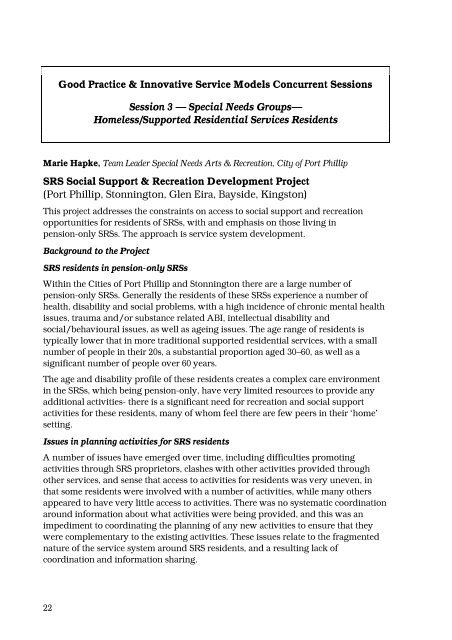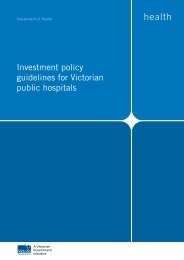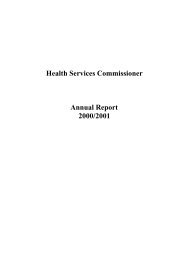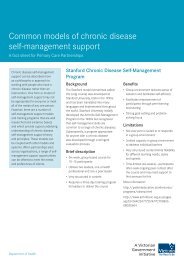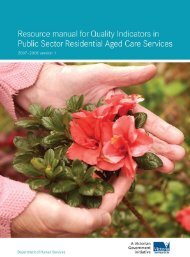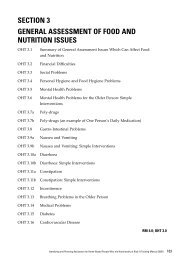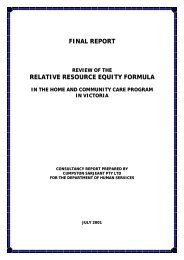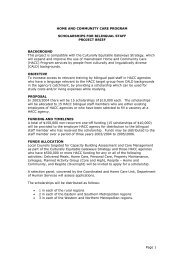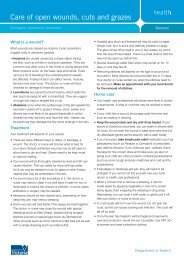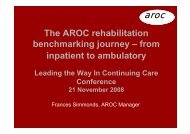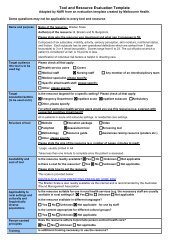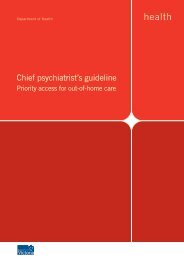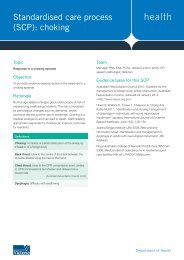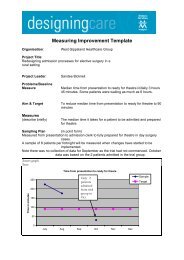Abstracts & Presentation Summaries - Department of Health
Abstracts & Presentation Summaries - Department of Health
Abstracts & Presentation Summaries - Department of Health
You also want an ePaper? Increase the reach of your titles
YUMPU automatically turns print PDFs into web optimized ePapers that Google loves.
Good Practice & Innovative Service Models Concurrent Sessions<br />
Session 3 — Special Needs Groups—<br />
Homeless/Supported Residential Services Residents<br />
Marie Hapke, Team Leader Special Needs Arts & Recreation, City <strong>of</strong> Port Phillip<br />
SRS Social Support & Recreation Development Project<br />
(Port Phillip, Stonnington, Glen Eira, Bayside, Kingston)<br />
This project addresses the constraints on access to social support and recreation<br />
opportunities for residents <strong>of</strong> SRSs, with and emphasis on those living in<br />
pension-only SRSs. The approach is service system development.<br />
Background to the Project<br />
SRS residents in pension-only SRSs<br />
Within the Cities <strong>of</strong> Port Phillip and Stonnington there are a large number <strong>of</strong><br />
pension-only SRSs. Generally the residents <strong>of</strong> these SRSs experience a number <strong>of</strong><br />
health, disability and social problems, with a high incidence <strong>of</strong> chronic mental health<br />
issues, trauma and/or substance related ABI, intellectual disability and<br />
social/behavioural issues, as well as ageing issues. The age range <strong>of</strong> residents is<br />
typically lower that in more traditional supported residential services, with a small<br />
number <strong>of</strong> people in their 20s, a substantial proportion aged 30–60, as well as a<br />
significant number <strong>of</strong> people over 60 years.<br />
The age and disability pr<strong>of</strong>ile <strong>of</strong> these residents creates a complex care environment<br />
in the SRSs, which being pension-only, have very limited resources to provide any<br />
additional activities- there is a significant need for recreation and social support<br />
activities for these residents, many <strong>of</strong> whom feel there are few peers in their ‘home’<br />
setting.<br />
Issues in planning activities for SRS residents<br />
A number <strong>of</strong> issues have emerged over time, including difficulties promoting<br />
activities through SRS proprietors, clashes with other activities provided through<br />
other services, and sense that access to activities for residents was very uneven, in<br />
that some residents were involved with a number <strong>of</strong> activities, while many others<br />
appeared to have very little access to activities. There was no systematic coordination<br />
around information about what activities were being provided, and this was an<br />
impediment to coordinating the planning <strong>of</strong> any new activities to ensure that they<br />
were complementary to the existing activities. These issues relate to the fragmented<br />
nature <strong>of</strong> the service system around SRS residents, and a resulting lack <strong>of</strong><br />
coordination and information sharing.<br />
22


